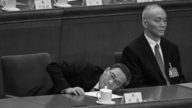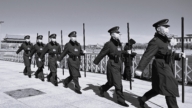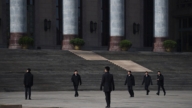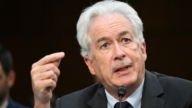【新唐人2013年03月26日讯】近年来,中国环境问题愈演愈烈,中共两会期间,不仅毒浓雾重锁北京,上海黄浦江还出现上万头死猪。有媒体形容,中国出现末日般景象。而担任8年的环保部长周生贤,却在新一届领导班子部长级任命时,保留了职位。引发中国网友炮轰。
当年揭露非典疫情的中共人大代表钟南山,今年在中共的两会上感叹:“人最关键的需要,一个是呼吸的空气,一个是吃的食物,一个是喝的水。这些在中国都不安全,什么幸福感都没有了。”
而美国《纽约时报》说,两会中共国家领导人换届时,中国出现了一片末日般的景象。给上海提供饮用水的河流中发现1万3千多头漂流的死猪。而类似于火山烟雾的雾霾笼罩着首都。
但是,在3月16号的中共人大代表会议上,周生贤却以最低支持票,保留了他环保部长的职位。
有网友质问,如果一条江里都是猪,其它河流已干涸,城镇笼罩在雾霭之中,数百万人罹患与粉尘相关的肺部疾病,这些算不算是环境部长的功劳?
另有网友细数周生贤在任8年的“成就”,其中有:
2006年在甘肃徽县的铅污染;2007年太湖爆发蓝藻;2010年紫金矿业污染;2011年康菲石油原油泄漏;2012年广西镉污染和北京的雾霭;2013年,山西的苯胺泄漏,山东的地下水污染和上海的死猪潮。
大陆网友王先生:“环保部是查哪个地方有污染,它应该进行处罚的,但是因为它腐败了,也许它拿着这个做由头,他去收钱去,只要给他钱,他就可以不罚,可以睁一只眼闭一只眼,从上到下都是这样。”
大陆的这名王姓网友还指出,凡是制造污染的大企业,他们的利益都跟当地的官员挂着钩。
王先生:“那么跟当官的利益有勾结了,他能去查吗?真正大的查不了,小的他也要认钱,就跟质检总局下去查产品质量问题,包括工商总局查这些问题一样,给钱就行,他们就只认钱。”
北京环保人士戴晴指出,中国环境问题变成现在这个状况,所有中国民众,包括中共人大代表都愤怒了。但是环保部那帮人,他们还是以当官为重,并不是以保护环境为职志。
北京环保人士戴晴:“我好好当我的官,我好好拿我的高工资,我好好享受我的各种官员待遇,我努力做到,起码在口头上要说,要保护环境,也制定一些政策,公布一些法规,但是他无能为力的时候,他绝对不会舍弃当官的任何好处。”
3月上旬,美国国家经济研究局发布一篇论文,作者通过对中国283个地级市的研究,发现中共地方官员花钱治理污染后,一般会升迁无望;而那些花大钱,造高速公路和其它交通基础设施,同时以环境为代价,增加GDP的官员却更有可能升官。
中共不但奖励污染环境的官吏,同时还阻止民众自发保护环境。相关数据显示,自1996年以来,中国因环境问题引发的大规模群体事件,每年增加的速度达到29%。
从厦门、宁波到大连的二甲苯(PX)化工项目;以及,从甚邡钼铜项目;到启东王子造纸排污项目,中共地方和厂商勾结,强制兴建污染工程,导致民众走上街头抗争,中共则派出军警血腥镇压。
旅美的中国时政评论专家伍凡认为,中国生态环保的恶化,将会造成人民的揭竿而起。
政论家伍凡:“生态环保越来越坏,这事牵扯到所有的人,不管你有钱没钱,有权没权,统统牵扯进去了,这是一个最能够激动人心,要结束共产党专政的。”
伍凡指出,中国的环境污染,就像中共的贪腐一样,多存在一天,多污染一天。当威胁到中国老百姓生存的时候,中共倒台也就指日可待了。
采访/陈汉 编辑/李韵 后制/李月
China: Pollution Worsening, Environmental Minister Keeps Job
China’s environmental deterioration
has intensified in recent years.
During the Chinese Communist Party(CCP)
Two Sessions, an extensive haze engulfed Beijing.
In Shanghai, over 10,000 dead pigs
were found floating in the Huangpu River.
Media have described how China
presents a doomsday scenario.
During the state leadership transition, Zhou Shengxian
held onto his seat as environmental protection minister.
Zhou has held the position for eight years, and has
become a target of criticism by Chinese netizens.
Media reported remarks from Zhong Nanshan, a
Deputy of the National People’s Congress (NPC).
He said: “The most important factors for
human survival are air, food, and water.
But they are all unsafe in today’s China,
which has driven away all happiness.”
The New York Times reported that China’s state leadership
transition took place “against an ominous backdrop”.
“Over 16,000 dead pigs have been found floating
in rivers that provide drinking water to Shanghai.”
“A haze akin to volcanic fumes cloaked the capital.”
On March 16, Zhou Shengxian held onto his
post with the lowest number of NPC votes.
A netizen asked, “when a river was covered
with dead pigs, while many others have dried up,
when cities are blanketed in smoke haze, while millions
of people have contracted dust-related lung disease,
should these be counted as the credits of the
environmental protection minister, or shouldn’t they?”
Another netizen cited major “achievements” that
Zhou made during his previous eight-year tenure.
In 2006, lead contamination in Huixian County, Gansu.
In 2007, a catastrophic blue-green
algae outbreak in Taihu Lake, Jiangsu.
In 2010, Zijin Mining’s pollution spill in Fujian.
In 2011, oil spills in Bohai Bay.
In 2012, cadmium pollution in
Guangxi, and thick haze in Beijing.
In 2013, aniline leakage in Shanxi.
In addition, groundwater pollution in Shandong,
and massive numbers of dead pigs in Shanghai rivers.
Mr. Wang, China netizen: “The environmental protection
ministry should’ve punished those sources of pollution.
But it’s too corrupt, so it may use them
as pretexts to collect money instead.
As long as it gets money, it’ll ignore the
pollution, which is its top-down practice.”
Mr. Wang adds that all polluting enterprises
have linked their interests with local officials.
Mr. Wang: “So after they have colluded with the officials,
will the officials really investigate and punish them?
For the large polluting enterprises, the
authorities won’t investigate seriously.
For the small ones, money can always get things straight.
The quality supervision authorities just
do the same, as all they want is money.”
Beijing environmentalist, Dai Qing, comments that
China’s worsening environment has aroused public fury.
Yet, for the CCP environmental protection officials,
they only focus on how to ensure they keep their posts.
Dai Qing: “They just think of keeping their jobs,
getting well paid, and enjoying all-sided welfares.
They will verbally promote environment protection, and
may even release some polices and regulations on it.
But when they fail to deal with situations, they’ll only
think of keeping their positions first and foremost.”
In early March, the National Bureau of Economic
Research of the US released a working paper.
It was based on 283 municipalities in China.
It stated that the officials’ promotion is unrelated
to their work achievements of dealing with pollution.
Rather, it is related to their boosting GDP, by building
highways and other transportation infrastructure.
In reality, the CCP regime has rewarded
its officials for not controlling pollution.
Also, it has blocked civilians’ voluntary
actions for environmental protection.
Public data shows that since 1996, environment
driven mass protests have increased by 29% annually.
They included mass protests against PX
projects in Xiamen, in Ningbo and in Dalian.
It also includes the molybdenum copper project in
Shifang, and Oji Paper mill’s sewage project in Qidong.
Collusions between local CCP authorities and businesses
initiated these polluting projects, resulting in mass protests.
The CCP sent soldiers and police to suppress them.
Critic Wu Fan says that the deterioration of China’s
environment will finally force civilians to rise up.
Wu Fan: “The environment in China has worsened.
It has affected everyone, the rich and
poor, the privileged or disadvantaged.
This is the highest stimulant that
may contribute to the CCP collapse.”
Wu Fan compared China’s environmental pollution to the
CCP corruption, as the longer it exists, the more it pollutes.
When it endangers people’s survival, the day of the
CCP’s downfall is around the corner, Wu Fan remarks.

























